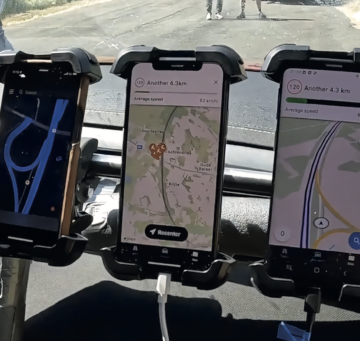MOBILIDATA

In Flanders, we strive to work on tomorrow’s mobility today. That includes the Mobilidata programme. With this programme, various levels of government, companies and researchers are jointly developing innovative, technological traffic solutions for road users, such as better route advice, tailored traffic notifications and intelligent traffic lights. New connected mobility and know-how do not stop at our national borders however, so international collaboration is needed to exchange knowledge and set up joint projects to implement it.
Objectives
In densely populated Flanders, urbanisation is constantly on the rise. However, our traffic infrastructure is not prepared for this. As a result, we all end up stuck in traffic more and more often. We aim to make our traffic safer and more efficient again, through knowledge and technology for generating, managing and sharing smart data.
► We can make traffic safer, smoother, more sustainable and comfortable by smartly organising the public data, businesses and road users and sharing real-time, relevant information with each other.
► This will lead to increased road safety, time savings, stress reduction, efficient communication and better air quality.
► In turn, strong mobility also ensures economic and social stability and stimulates growth.

Data as the basis for traffic solutions
Within the Mobilidata programme, 31 traffic solutions were developed in 5 categories: intelligent traffic lights, risk and hazard notifications, navigation and parking management, traffic rule notifications and policy support. Data sharing and collection are the basis for communication between the smart road infrastructure and the road user. These solutions will be available to Flemish road users from 2023 and 2024 on. Beyond the rollout of those identified traffic solutions, Mobilidata also focuses on further research into new traffic solutions and their market uptake, that have distinct societal value, such as accommodating cycling groups, supporting vulnerable (groups of) road users such as the blind and visually impaired and encouraging modal shift among commuters.
Collaborate on tomorrow’s mobility
Before we can safely implement tomorrow’s mobility, we need to provide a strong physical and digital base. In addition, international coordination and cooperation are essential, as future (eventually autonomous) mobility extends beyond our national borders. That is why we are happy to share best practices from the Mobilidata programme, but also look for interesting cross-border projects.
Latest insights & stories

What does the NIS2 directive mean for your business?
The NIS2 Directive will come into force on October 18, 2024. Companies must take the appropriate measures to ensure their cybersecurity. Valéry Vander Geeten of the CCB and Bart Callens of Proximus NXT set out the preparations you should prioritize.

PROJECT OLIVIA
Every year, the amount of transport over water rises. The same is true for the number of jobs in the maritime sector, in multinationals, local start-ups and within the government. However, it remains a predominantly male sector. We want to change that with Project Olivia, by inspiring women to choose a job on, by or around the water. A goal that we share with many other countries and one which we are eager to cooperate on internationally.

AI will represent 10% of global IT spending by 2028: here's where to invest
As AI accelerates towards becoming 10% of global IT spending by 2028, the challenge lies in choosing the right areas for investment. Explore our insights on how to direct your AI budget towards high-impact, scalable projects that generate measurable business value. Unlock the strategies to turn potential into performance.